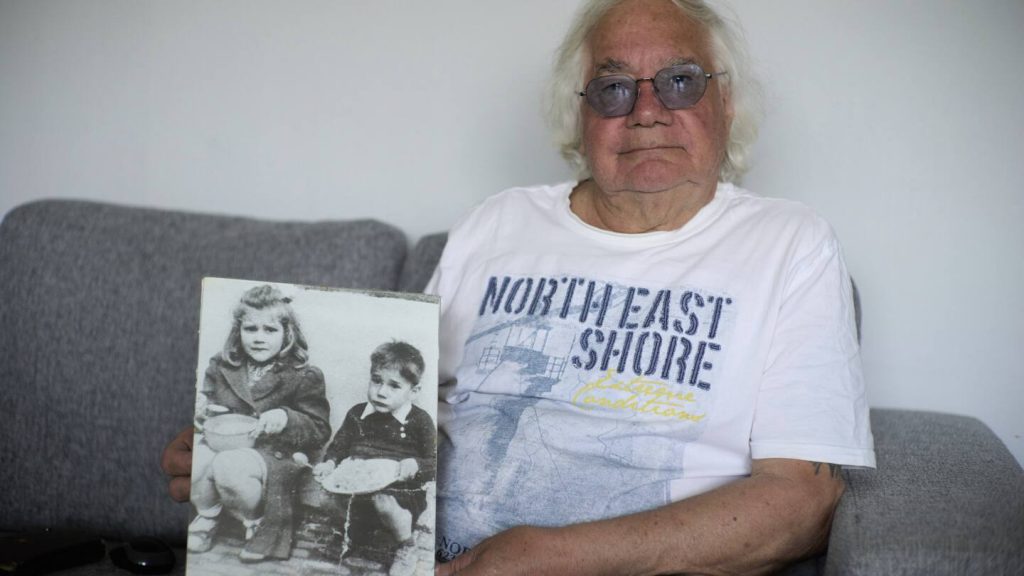DELFT, Netherlands (AP) — Ben Buitenhuis doesn’t get hungry. He never really has since the end of World War II, when he had to use his wits to scavenge for milk powder or wait in line for a meager ration of a meal made from flower bulbs.
“My wife used to say, ‘If I have to wait for you, I’ll never get any food,’” he said, chuckling at the memory of his wife, Ria, who died in 2023. “And I think that’s an after effect of the war, when you never got enough to eat. I don’t know the feeling of hunger.”
Buitenhuis, now an 83-year-old retired truck driver, was one of the lucky ones.
Too late for some
The end of the Nazi occupation of the Netherlands on May 5, 1945 — 80 years ago on Monday — came too late for around 20,000 people who died of as a result of starvation or freezing temperatures in what the Dutch call, with a grim simplicity, The Hunger Winter of 1944-45.
While Allied forces including American, British, Canadian and Polish troops liberated parts of the southern Netherlands in 1944, the more densely populated western part of the country, including major cities Amsterdam and Rotterdam had to wait months before their war finally ended with the German capitulation.
On Monday, veterans and dignitaries will gather in the central town of Wageningen, where German top brass signed the capitulation order that ended the occupation, to celebrate the 80th anniversary of the day the entire Netherlands once again tasted freedom. A day earlier, the Netherlands solemnly remembers its war dead.
Famine in the west
The long weeks and months between the liberation of the south and the final German capitulation turned into a famine in the west. There wasn’t enough food to eat or fuel to heat homes in a freezing winter.
As German occupiers desperately tried to feed their homeland’s faltering war machine with any resources plundered from the occupied Dutch territory, the Netherlands’ government in exile in London called for a rail strike that halted many trains, including those carrying food from the fertile fields of the eastern Netherlands.
The strike, called in September 1944, was intended to hamper the Nazi war effort as Allied forces prepared to make their final push into Germany, but it also had the effect of cutting off vital supplies from the fertile fields of the Dutch agricultural heartland to the densely populated cities of the west.
Flower bulbs and stolen sugar beets
A photo taken of Buitenhuis in early 1945 shows him sitting next to a girl called Neeltje, clutching a plate and spoon. It’s an emblematic image for the plight of children facing famine caused by German occupation and Dutch efforts to end it.
Buitenhuis remembers taking a bowl to a milk factory next to his home in Delft and waiting until a sack with powdered milk fell and spilled open. He filled the bowl with water then emptied it so that when he scooped up powder and was inevitably told to empty it again some of the powder stuck to the wet surface.
“That way we’d have a sort of milk,” he said.
Other times, he and other children would use a stick with a nail driven through one end to snag a single sugar beet from a cart driving past.
Recipes circulated in the Netherlands for preparing tulip bulbs to eat because they provided at least some nourishment. Many families walked east or north in search of food and warmth, according to the Dutch Institute for War Documentation.
Churches and governments set up kitchens in an attempt to feed the starving, and tens of thousands of children from the cities were sent to foster families in rural areas.
Those, like Buitenhuis, who survived lived with the legacy of hunger.
After the war, he and other children like him who had survived the famine were sent to recuperate at sanatoriums. Buitenhuis spent six weeks at one. Every morning, he’d get a boiled egg for breakfast that he gave to other children, because he was allergic to the egg white.
Remember, but don’t look back in anger
Sitting in his ninth-floor apartment on the edge of Delft, he recalls the harsh winter 80 years ago without a trace of bitterness or malice. And he says he’s glad that the war is still commemorated even as the number of survivors dwindles.
“It’s something to maintain, so that people still understand what freedom is,” he said.
But while he values the way the world commemorates the end of the war, Buitenhuis prefers not to dwell too much on the past.
“Look at what’s in front of you, not what’s behind,” he said. “That’s over, you can’t get it back.”
___
AP journalist Molly Quell contributed to this report.


